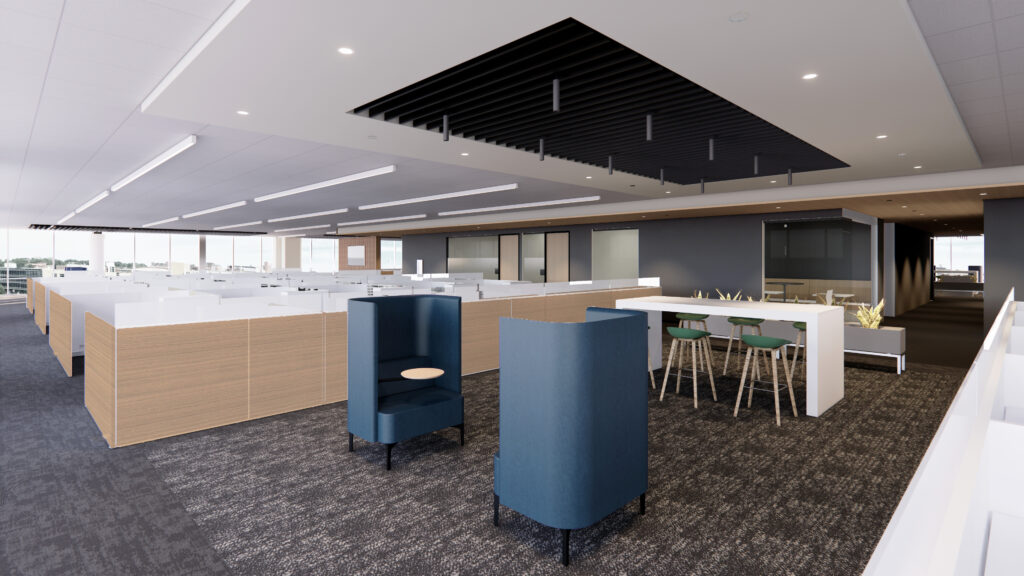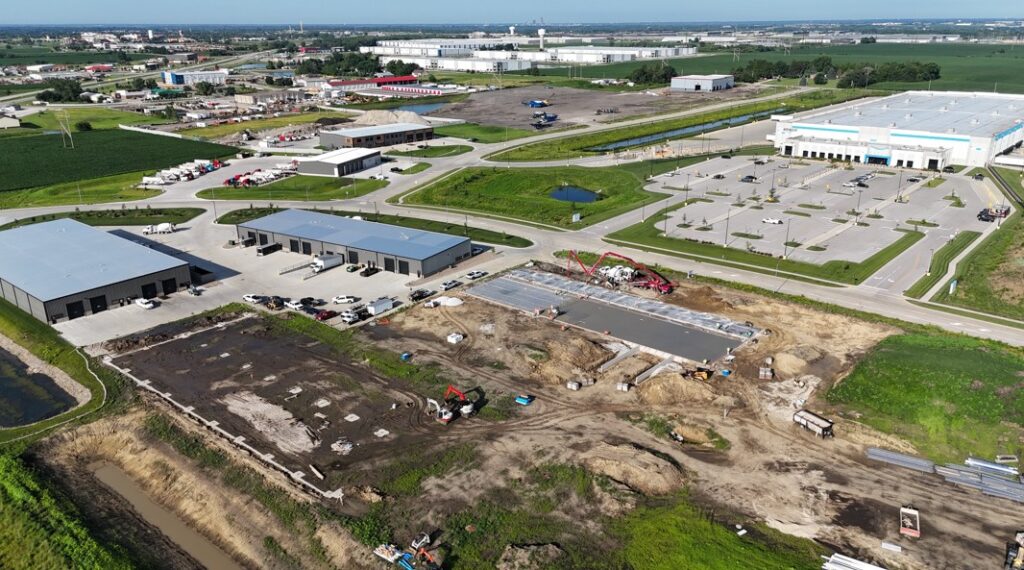Renew: Road can be rough to redevelop old properties

Business Record Staff Jun 17, 2016 | 11:00 am
8 min read time
1,910 wordsBusiness Record Insider, Real Estate and DevelopmentChris Murray can tolerate the bumps in the road.
First evidence of that occurs during a tour of various development projects in Greater Des Moines. You’re cruising along a relatively smooth patch of pavement, let’s say North Ankeny Boulevard, and the next thing you know, Murray has maneuvered the black Cadillac Escalade to the back side of a retail strip center and, when confronted with some sort of construction markers, the big piece of steel is hopping a curb.
Farm fields, construction trenches — Murray has negotiated some road hazards over his 14 years in commercial real estate. Whether it’s potholes or development projects, he seems to take the bumps in stride. They smooth out over time.
Murray is the president and CEO of Denny Elwell Co. Although the company can account for millions of square feet of new development in Ankeny, it also is gaining a reputation for breathing new life into old, unused or underperforming shopping centers in Greater Des Moines.
Such centers are a favored acquisition target for Murray. But Denny Elwell Co. is not alone in finding retail diamonds in the rough of the local commercial real estate market. Hurd Real Estate Services and Signature Real Estate Services, sometimes working together and sometimes on their own, have demonstrated an ability to revitalize old and rundown retail and office buildings.
Knapp Properties Inc. is planning a rehab at a shopping center it owns on Hubbell Avenue, and earlier this month Colby Interests unveiled plans for a renovation at its Apple Valley shopping center in Windsor Heights.
A noticeable trend here is that these companies are in the Greater Des Moines property ownership, development and management business for the long haul. Redeveloping commercial sites, right now, is a profitable alternative to building new.
Though the rehab business isn’t the sole domain of local owners — Murray said his company bought and rehabbed Governor Square shopping center in West Des Moines in part because he had heard that Denver-based Baceline Investments was planning to rejuvenate Clocktower Square, located directly west of the Elwell property — it does illustrate the commitment local owners have to improving their properties.
The Colby project also demonstrates the need for long-term property holders to be nimble. Initial plans were for an estimated $10 million project to raze and rebuild Apple Valley. When the Windsor Heights City Council nixed plans to anchor the redevelopment with an Aldi’s grocery store, Colby turned to a much less expensive renovation that will give new life to the shopping center and provide more retail options near a busy Greater Des Moines intersection.
For Murray, a nimble maneuver over and around the bumps of the commercial real estate market is all part of the business.
“You have to have multiple plans,” he said. “We might have to retrench and go in a different direction.” After all, especially when you’re working in retail, “The consumer drives what happens.”
A case in point is the former Dahl’s grocery store at North Ankeny Boulevard and Northwest 18th Street in Ankeny. Elwell Co. bought the 66,643-square-foot store and the seven acres where it is located for $3 million in June 2014.
At the time, Dahl’s was closing and selling some stores; it would eventually file for bankruptcy.
Murray figured that sitting on a busy street and flanked by Elwell-0wned development ground, the site would be a magnet for another grocery store.
He was wrong.
“At the time, I thought I could get a national grocer in there. At this time, it has not worked out to be a grocery store,” Murray said.
Murray decided to follow an alternative. The Dahl’s property came with available unused space, enough to add another building or two. One section of the site was purchased for a Taco Bell. Another food establishment could land on the property.
And the building itself, well, it’s slowly filling up with a large multi-themed restaurant called The Fletcher in honor of Ankeny’s first mayor, which will include a cafe, craft bar and sit-down restaurant. The food production arm of the former Gino’s restaurant is taking over more space and taking advantage of the former grocery store’s state-certified production and storage areas.
That leaves roughly half of the building to fill, but Murray isn’t fretting over the future of the space. Neither, apparently, is company founder Denny Elwell. He walked through the area recently saying that he was looking for a broom to sweep up some construction dust. He was in a jovial mood.
Murray says another slow-to-fill property is the former Bob Brown dealership on the northwest corner of Merle Hay Road and Aurora Avenue in Urbandale. Elwell Co. bought the site in partnership with Reuter & Zenor Co. for $2.75 million in May 2012. At the moment, there are no tenants for the dealership building, but the partnership has sold two lots on the property. One building will house a Dunkin’ Donuts and a Pita Pit, and the other a Discount Tire store.
As for the dealership building itself, the use of heavy steel beams opens up more than an acre of space under roof that is clear of support columns or walls. One possible tenant could take up the service bay with its large garage doors. The remainder of the building could be divided into 8,000-square-foot spaces. For now, much of the building retains the feel of the auto dealership, which first occupied the spot in 1981. Sales cubicles are in place. Auto dealer Ron Brown’s desk, complete with granite surface, was left behind in the sale. The dealership now operates in Urbandale.
Murray said that before deciding to buy the property, he drove through the neighborhood, putting more miles on that Escalade. It’s something he does frequently when buying retail. He wants to know who will make up the customer base.
“You have to ask yourself, ‘who’s buying?’ ” he said.
Murray liked the spot at Merle Hay and Aurora. Located just south of Interstate Highway 35/80 and north of Merle Hay Plaza, it had lots of traffic. And it was a prominent spot. Bob Brown Chevrolet had operated there for at least 30 years. And it had neighborhoods.
“It’s been a big corner my entire life,” Murray said.
He drove the neighborhoods to find out whether lawns were trim in the summertime and sidewalks cleared of snow in the winter. They were. Those homeowners probably were going to spend their disposable income fairly close to home, Murray said.
As he does on all properties, Murray enlisted Simonson & Associates Architects to come up with an exterior design that would provide some individuality to retailers and also provide the sense that those establishments were under one roof.
The Des Moines-based architect firm has firsthand experience with old auto dealerships. Its office is in the former Conway Buick dealership on Ingersoll Avenue. The Hurd renovation of the former Quality Ford site on Eighth Street in West Des Moines carries the Simonson stamp. Those locations reveal few hints of their pasts.
Simonson partner Clark Snyder said that repurposing old retail centers is more complicated than slapping on a new facade with a clean and contemporary look.
Developers have expectations, the demands of local governments change across Greater Des Moines, and retail tenants crave their own identity, especially national brands.
And, to some extent, you have to anticipate the future.
“You never know what’s going to happen six months or five years down the road,” Snyder said.
An example is the recently abandoned Fresh Market store at Hurd’s Mills Crossing development in West Des Moines. Snyder designed the building so the deep grocery space could be subdivided into smaller spaces if another grocer does not move into the spot.
“Regardless of whether a client is building new or repurposing old buildings, they take a hard look at space with an eye to the future,” Snyder said.
One of the first things Simonson does when it takes on a project is take aerial photographs and count the available parking stalls to see whether they satisfy local requirements and where more spaces can be added, if need be. A restaurant — such as The Fletcher, which will take up a large chunk of the former Dahl’s building, requires about double the number of spaces needed by other retailers.
If nothing else, building owners want some flexibility built into their plans. Most local owners plan to hold the property for many years. Typically, they are not buying, improving, and then flipping the property, Snyder said.
With all of that considered, many developers believe a redevelopment makes more financial sense than a new construction.
“Developers see the value of finding existing centers. It gives them a chance to breathe new life into these existing centers and attract new tenants,” Snyder said.
Murray estimated the cost of repurposing old buildings at about $100 a square foot, including the purchase of the property. A new building, including land costs, runs about $160 a square foot. Those savings can be passed on to tenants, he said.
Most developers already have at least one tenant or end user in mind when they launch a redevelopment project, he said.
For developer Richard Hurd, the first tenant is the key to the success of a renewal project.
“You have to have a good, solid base,” Hurd said. “You can’t start out with a weak tenant.”
He uses the Quality Ford project as an example. Hurd bought the property at a time when Eighth Street had “a lot of dark real estate,” he said.
But it also had the qualities that Hurd and Murray and other developers of old properties look for. Traffic volume is key. Quality Ford also had an interchange off of Eighth onto Interstate 235 and a traffic-light-controlled intersection at Eighth and Office Park Road led directly to the Quality Ford site.
Hurd also had to be nimble. A movie production company was going to buy the site. It backed out when the state suspended its film tax credit program in 2009. Hurd went to a backup plan.
“We always had confidence that we could bring quality users to that site and attract more,” he said.
As with all redevelopment projects, a lot of ideas were kicked around the Hurd office. When a concept was hatched, designers were called in — Simonson & Associates in this case.
“The whole concept of conversion is born in our office in terms of what we think we can do with these properties,” then the architects are called in to help flush out the plans, Hurd said.
The Quality Ford building had unique features, such as exposed beams that supported a mezzanine. The mezzanine was removed while the beams remained to give the building an industrial feel. Unity Point was the quality tenant that was first in the door; next came Jimmy John’s restaurant. Mercy Ambulance rents the east end of the building and can take advantage of garage doors that remained with the building, which now has a mix of retail and office users.
And Hurd found uses for the remainder of the property. Kum & Go LC built a convenience store, and the first Dunkin Donuts in Greater Des Moines opened at the site. Hurd has since sold the property to a California investor for about $6 million.
The project resulted in a Class A building, Snyder said. And, with all the bumps in the road, what more can you ask?









